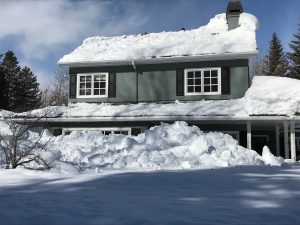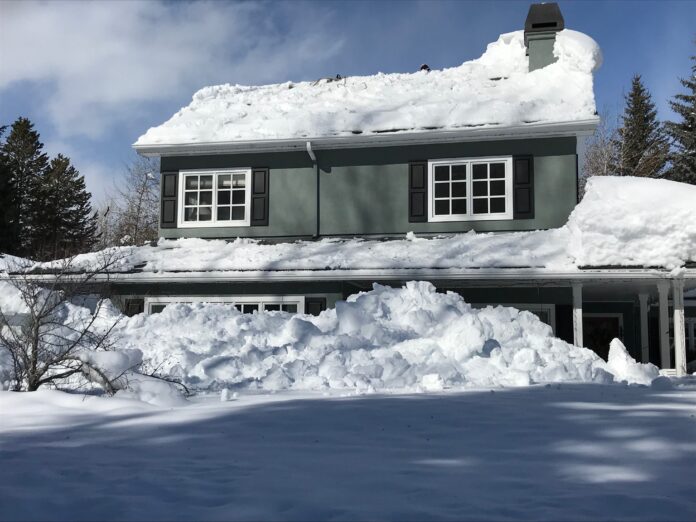By Hayden Seder

When the first big storms of the season came, they were met with complete enthusiasm and stoke. Thoughts of waist-deep powder runs, backcountry excursions, and ways to thank the snow gods were on everyone’s minds.
But then the snow kept coming, and coming. Problems with the mass amounts of snow began to accumulate: icy roadways, snow-laden rooftops, cancelled or deterred travel plans. For small-business owners, homeowners, and homeowners’ associations (HOAs), this record-setting snowfall has made quite an impact budget-wise as everyone attempted to keep up with the onslaught. Here are some of their stories.
The Wilsons
“As of early February, our plowing was already twice what it cost last year,” said Alaina Wilson, who lives with her husband Ashton in their home of one-and-a-half years in Triumph. “Otherwise, we’ve been pretty lucky. We haven’t had any major repairs and we also had a new roommate move in in January with a snowblower just in time.”
The Seders
Not all homeowners have been as lucky, as expenses like snow removal and plowing, and non-monetary setbacks like getting cars out of driveways, getting frozen garage doors unstuck, and more, have created a winter of woes. Eric and Susan Seder own a house in west Ketchum. They were presented with an onslaught of budget-breaking setbacks due to snow. While out of town for the first two weeks of February, the driveway-heating system for the house failed, which led to the accumulation of snow for weeks on end.
“We didn’t know what was happening, so the snow piled up in the driveway and on the sides,” Susan Seder said. “We don’t usually pay someone to plow our driveway in the winter because the heated pavers work.”
Once they paid to have the heating system fixed, they still had to pay someone to plow the sides of the driveway where snow had piled up to roughly 10 feet. The couple also had to have snow removed from their roof, which damaged the landscaping of the house, including the garden featured within the Garden Tour last year.
“We’ve only had to remove the snow from our roof once before, in 2017, and when it melted that spring, we had to spend thousands of dollars repairing the landscape it ruined,” Susan Seder said.
The Condo Folks
For those living in condominiums, they can rest assured that their property management/HOA will take care of things. But for those property managers, this year’s snow has been a real budget breaker.
Sheri Thomas, owner of Boulder Mountain Property Management, has being doing HOAs since 1991 and has 15 to date that she manages.
“Due to the scenario in 2017, I consistently use the larger dollar figure for the budget amount,” Thomas said. “The fact that it started out looking like a drought season, I was hopeful to have extra money at the end of the snow season, but that is not the case now.”
Thomas points out quite a few of the difficulties that she sees as a property manager, such as the lack of snow storage that developers failed to plan for in their developments that were built during drought years.
“Snow hauling was a big expense, as well as roof shoveling for complexes built prior to proper building codes for snow loads,” Thomas said.
Thomas also says that those with radiant-heated paver systems saw an increase in gas and electric usage from last year. Another unexpected expense Thomas sees is larger temperature gradients, which have increased ice dams and leaks in roofs.
The Good News
The snow hasn’t been bad for all budgets, though, as some businesses thrived during the unexpected heavy snow. With more tourists coming to ski in a period of the year that is usually quiet, hotels, restaurants, equipment rental shops and more have all seen an uptick in business. Privately-owned snow removal businesses can’t keep up with the demand, some working 60-hour weeks just to make sure all customers are attended to.
No matter the situation, Wood River Valley residents know that the story doesn’t end in March. The next plot twist in the story of snow: What will we do when it melts?

